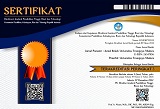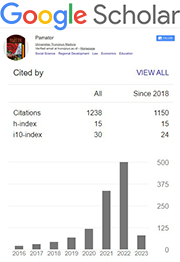Evaluasi Program Usaha Mikro, Kecil, Dan Menengah (Model Kewirausahaan Sosial Di Kota Serang)
Abstract
Tujuan penelitian adalah untuk mendiskusikan evaluasi program kewirausahaan sosial dengan penitikberatan pada tiga aspek yaitu kepemimpinan, kemampuan inti dan dinamis, kemampuan pertumbuhan substantif. Metode penelitian kualitatif dipilih dalam studi ini dengan melakukan wawancara mendalam terhadap tiga UMKM kewirausahaan sosial yang berada di Kota Serang. Hasil penelitian menunjukkan bahwa faktor kepemimpinan, kemampuan inti dan dinamis serta kemampuan pertumbuhan substantif sebagai instrumen evaluasi program kewirausahaan sosial di Kota Serang sudah berjalan cukup efektif, hal ini terlihat dari pencapaian tujuan program UMKM yang mampu menanamkan nilai-nilai sosial kepada masyarakat selain dampak ekonomis. Temuan penelitian menunjukkan bahwa proses inovasi, kerjasama dan pemahaman pengetahuan sumber daya manusia yang dilaksanakan secara berkelanjutan merupakan faktor-faktor yang dapat mendukung evaluasi program kewirausahaan sosial.
Keywords
Full Text:
PDF (Bahasa Indonesia)References
Aggarwal, N., Khurana, S., & Aggarwal, M. (2020). A paper On The Success of Social Entrepreneurship in India. International Journal of Scientific and Technology Research, 9(1), 1702–1707.
Aguilera, R. V., Judge, W. Q., & Terjesen, S. A. (2018). Corporate governance deviance. Academy of Management Review, 43(1), 87–109. https://doi.org/10.5465/amr.2014.0394
Ashoka. (2011). What is a Social Entrepreneur. Ashoka Indonesia. https://www.ashoka.org/en-id/country/indonesia (Diakses pada tanggal 24 Maret 2022)
Autio, E., Kenney, M., Mustar, P., Siegel, D., & Wright, M. (2014). Entrepreneurial innovation: The importance of context. Research Policy, 43(7), 1097–1108. https://doi.org/10.1016/j.respol.2014.01.015
Bantennews. (2021, November). Mampu Serap 2,1 Juta Tenaga Kerja, Pemprov Banten Berdayakan UMKM untuk Bangkit Akibat Pandemi Covid-19. BantenNews.Co.Id. https://www.bantennews.co.id/mampu-serap-21-juta-tenaga-kerja-pemprov-banten-berdayakan-umkm-untuk-bangkit-akibat-pandemi-covid-19/ (Diakses pada tanggal 21 Februari 2022)
BPS Kota Serang. (2021). Kota Serang dalam Angka 2021. In Kota Serang Dalam Angka. Badan Pusat Statistik Kota Serang Provinsi Banten. https://serangkota.bps.go.id/publication/2021/02/26/92d07f0edc333af1889f4a49/kota-serang-dalam-angka-2021.html
Brousselle, A., & Champagne, F. (2011). Program theory evaluation: Logic analysis. Evaluation and Program Planning, 34(1), 69–78. https://doi.org/10.1016/j.evalprogplan.2010.04.001
Bull, M. (2008). Challenging Tensions: Critical, Theoretical and Empirical Perspectives on Social Enterprise. International Journal of Entrepreneurial Behaviour & Research, 14(5), 268–275. https://doi.org/10.1108/13552550810897641
Carpenter, M. A., Geletkancz, M. A., & Sanders, W. G. (2004). Upper Echelons Research Revisited: Antecedents, Elements, and Consequences of Top Management Team Composition. Journal of Management, 30(6), 749–778. https://doi.org/10.1016/j.jm.2004.06.001
Chang, S., & Jeong, M. (2021). Does Leadership Matter in Performance of Social Enterprises in South Korea? Sustainability (Switzerland), 13(20), 1–19. https://doi.org/10.3390/su132011109
de los Ríos-Sastre, S., & González-Sánchez, V. M. (2019). Social entrepreneurship and sustainable development: New challenges and opportunities. Analyzing the Relationship Between Innovation, Value Creation, and Entrepreneurship, December, 64–84. https://doi.org/10.4018/978-1-7998-1169-5.ch004
Defourny, J., & Nyssens, M. (2010). Conceptions of Social Enterprise and Social Entrepreneurship in Europe and the United States: Convergences and Divergences. Journal of Social Entrepreneurship, 1(1), 32–53. https://doi.org/10.1080/19420670903442053
Díez, J. C., & Saiz-Alvarez, J. M. (2016). Leadership in Social Entrepreneurship. 134–153. https://doi.org/10.4018/978-1-5225-0097-1.ch008
Doh, S. (2020). Social Entrepreneurship and Regional Economic Development: The Case of Social Enterprise in South Korea. Sustainability (Switzerland), 12(21), 1–20. https://doi.org/10.3390/su12218843
Dwianto, A. S., & Purnamasari, P. (2018). Social Entrepreneurship: Innovation and Challenges in the Free Competition Era. Transaksi, 39–48. http://110.35.83.7/index.php/transaksi/article/download/612/259
Ebrashi, R. El. (2013). Social entrepreneurship theory and sustainable social impact. Social Responsibility Journal, 9(2), 188–209. https://doi.org/10.1108/SRJ-07-2011-0013
Eldar, O. (2014). The Role of Social Enterprise and Hybrid Organizations. SSRN Electronic Journal. https://doi.org/10.2139/ssrn.2379012
Ensley, M. D., Hmieleski, K. M., & Pearce, C. L. (2006). The Importance of Vertical and Shared Leadership within New Venture Top Management Teams: Implications for the Performance of Startups. Leadership Quarterly, 17(3), 217–231. https://doi.org/10.1016/j.leaqua.2006.02.002
Fear, W. J. (2007). Programme Evaluation Theory: The Next Step Toward a Synthesis of Logic Models and Organizational Theory. Journal of MultiDisciplinary Evaluation, 4(7), 13–15.
Guiu, S. S. (2018). Theory of Change in Program Evaluation (Issue October). Innovations for Poverty Action. https://projectrg.org/wp-content/uploads/2018/11/Theory-of-Change-in-Program-Evaluation.pdf
Gupta, V., MacMillan, I. C., & Surie, G. (2004). Entrepreneurial leadership: Developing and measuring a cross-cultural construct. Journal of Business Venturing, 19(2), 241–260. https://doi.org/10.1016/S0883-9026(03)00040-5
Haugh, H. (2005). A Research Agenda for Social Entrepreneurship. Social Enterprise Journal, 1(1), 1–12. https://doi.org/10.1108/17508610580000703
Haugh, H. M., & Talwar, A. (2016). Linking Social Entrepreneurship and Social Change: The Mediating Role of Empowerment. Journal of Business Ethics, 133(4), 643–658. https://doi.org/10.1007/s10551-014-2449-4
Heinecke, A., Magdalena, K., & Krzeminska, A. (2014). Leadership in Social Enterprise How to Manage Yourself and the Team SCHWAB FOUNDATION FOR SOCIAL ENTREPRENEURSHIP. World Economic Forum, May.
Idris, A., & Hijrah Hati, R. (2013). Social Entrepreneurship in Indonesia: Lessons from the Past. Journal of Social Entrepreneurship, 4(3), 277–301. https://doi.org/10.1080/19420676.2013.820778
Invest Northern Ireland. (2016). Social Entrepreneurship Programme Evaluation. In Cogent Management Consulting (Issue March). https://secure.investni.com/static/library/invest-ni/documents/social-entrepreneurship-programme-final-evaluation-report-march-2016.pdf
J. Bryce, H. (2014). Public policy rules and norms in choice of a nesting place of a social enterprise : Firm or nonprofit? Journal of Entrepreneurship and Public Policy, 3(2), 237–253. https://doi.org/10.1108/JEPP-12-2012-0055
Johansson, J., & Gabrielsson, J. (2021). Public policy for Social Innovations and Social Enterprise—What’s the Problem Represented to Be? Sustainability (Switzerland), 13(14). https://doi.org/10.3390/su13147972
Juneja, P. (2021). Principles of Social Business. Management Study Guide Content Team. https://www.managementstudyguide.com/social-business-principles.htm (Diakses pada tanggal 01 April 2022)
Kibler, E., Salmivaara, V., Stenholm, P., & Terjesen, S. (2018). The evaluative legitimacy of social entrepreneurship in capitalist welfare systems. Journal of World Business, 53(6), 944–957. https://doi.org/10.1016/j.jwb.2018.08.002
Kimmitt, J., & Muñoz, P. (2018). Sensemaking the ‘social’ in social entrepreneurship. International Small Business Journal: Researching Entrepreneurship, 36(8), 859–886. https://doi.org/10.1177/0266242618789230
Kor, Y. Y., Mahoney, J. T., & Michael, S. C. (2007). Resources, Capabilities and Entrepreneurial Perceptions. Journal of Management Studies, 44(7), 1187–1212. https://doi.org/10.1111/j.1467-6486.2007.00727.x
Koryak, O., Mole, K. F., Lockett, A., Hayton, J. C., Ucbasaran, D., & Hodgkinson, G. P. (2015). Entrepreneurial leadership, capabilities and firm growth. International Small Business Journal: Researching Entrepreneurship, 33(1), 89–105. https://doi.org/10.1177/0266242614558315
Kumar, N. (2020). Social Business Model and its Efficacy: A Case Study on Agroforestry in the Indian Context. Journal of Entrepreneurship and Innovation in Emerging Economies, 6(1), 195–219. https://doi.org/10.1177/2393957519899568
Kusumasari, B. (2015). The Business Model of Social Entrepreneurship. International Journal of Administrative Science & Organization, 22(3), 157–167.
Lopez-acevedo, G. (2015). Evaluating Small and Medium Size Enterprise Programs (Issue October). The World Bank.
Makara, P. (1994). Policy Implications of Differential Health Status in East and West Europe. The Case of Hungary. Social Science and Medicine, 39(9), 1295–1302. https://doi.org/10.1016/0277-9536(94)90361-1
Maksum, I. R., Sri Rahayu, A. Y., & Kusumawardhani, D. (2020). A Social Enterprise Approach to Empowering Micro, Small and Medium Enterprises (SMEs) in Indonesia. Journal of Open Innovation: Technology, Market, and Complexity, 6(3). https://doi.org/10.3390/JOITMC6030050
Miles, M. B., Huberman, M. A., & Saldaña, J. (2014). Qualitative Data Analysis, A Methods Sourcebook. In Qualitative Data Analysis A Methods Sourcebook (3rd ed.). SAGE Publications Inc.
Minkler, M. (1992). Community Organizing Among the Elderly Poor in the United States: A Case Study. International Journal of Health Services, 22(2), 303–316. https://doi.org/10.2190/6KFL-N1WY-NPDG-RXP5
Nicholls, A. (2006). Social Entrepreneurship New Model of Sustainable Change. In Oxford University Press. https://doi.org/10.1111/j.1467-8705.1995.tb01084.x
Oberoi, R., Halsall, J. P., & Snowden, M. (2021). Reinventing social entrepreneurship leadership in the COVID-19 era: engaging with the new normal. Entrepreneurship Education, 4(2), 117–136. https://doi.org/10.1007/s41959-021-00051-x
Oktavia, T. (2017). Evaluation Of Micro, Small and Medium Enterprises Development Program In PT Freeport Indonesia. International Journal of Human Capital Management, 1(2), 19–26.
Pareja-Cano, B., Valor, C., & Benito, A. (2020). How Social Enterprises Nurture Empowerment: A Grounded Theoretical Model of Social Change. In Journal of Social Entrepreneurship (Issue October). https://doi.org/10.1080/19420676.2020.1821753
Prabhu, G. N. (1999). Social entrepreneurial leadership. Career Development International, 4(43), 140–145. http://dx.doi.org/10.1108/13620439910262796
Prasetyantoko, A. (2010). Pemberdayaan UMKM sebagai Perwujudan Demokrasi Ekonomi di Indonesia (Jurnal Sosial Demokrasi Vol.9 No.3 Juli-Sep 2010 p.38-43). Pergerakan Indonesia dan Komite Persiapan Yayasan Indonesia Kita. https://lib.atmajaya.ac.id/default.aspx?tabID=61&src=k&id=182007
Ramhawati, F. (2021). Kisah Inspiratif Nur Agis Aulia, Dari Tukang Kambing, Kini Duduk di Kursi DPRD Kota. Kabar Banten. https://kabarbanten.pikiran-rakyat.com/seputar-banten/pr-591390032/kisah-inspiratif-nur-agis-aulia-dari-tukang-kambing-kini-duduk-di-kursi-dprd-kota-serang?page=3 (Diakses pada tanggal 01 April 2022)
Rawhouser, H., Cummings, M., & Crane, A. (2015). Benefit Corporation Legislation and the Emergence of a Social Hybrid Category. California Management Review, 57(3), 13–36.
Rich, M. J., & Stoker, R. P. (2010). Rethinking Empowerment: Evidence from Local Empowerment Zone Programs. Urban Affairs Review, 45(6), 775–796. https://doi.org/10.1177/1078087410366530
Rogers, P. J. (2005). Program Theory: Not Whether Programs Work but How They Work. In D.L. Stufflebeam, G.F. Madaus and T. Kellaghan (eds.). Evaluation Models (pp. 209–232). Kluwer Academic Publishers. Boston. https://doi.org/10.1007/0-306-47559-6_13
Santos, I. O. (2018). Public Policy , Policy-Making and Social Entrepreneurship – The Case of Portugal and the UK. June, 1–75.
Sekliuckiene, J., & Kisielius, E. (2015). Development of Social Entrepreneurship Initiatives: A Theoretical Framework. Procedia - Social and Behavioral Sciences, 213, 1015–1019. https://doi.org/10.1016/j.sbspro.2015.11.519
Sharpe, G., & Bay, N. (2011). A Review of Program Theory and Theory-Based Evaluations. American International Journal of Contemporary Research, 1(3), 1998–2001.
Stephan, U., Uhlaner, L. M., & Stride, C. (2015). Institutions and social entrepreneurship: The role of institutional voids, institutional support, and institutional configurations. Journal of International Business Studies, 46(3), 308–331. https://doi.org/10.1057/jibs.2014.38
Storey, D. J. (2009). Evaluating SME Policies and Programmes: Technical and Political Dimensions. In The Oxford Handbook of Entrepreneurship (Issue April 2018). https://doi.org/10.1093/oxfordhb/9780199546992.003.0010
Teece, D. J. (2012). Dynamic Capabilities: Routines versus Entrepreneurial Action. Journal of Management Studies, 49(8), 1395–1401. https://doi.org/10.1111/j.1467-6486.2012.01080.x
Thompson, J. L. (2008). Social enterprise and social entrepreneurship: where have we reached? A summary of issues and discussion points. Social Enterprise and Social Entrepreneurship, 4(2), 149–161.
Tišma, S., Maleković, S., Jelinčić, D. A., Škrtić, M. M., & Keser, I. (2022). From Science to Policy: How to Support Social Entrepreneurship in Croatia. Journal of Risk and Financial Management, 15(1), 23. https://doi.org/10.3390/jrfm15010023
Turok, I., & Raco, M. (2000). Developing expertise in small and medium-sized enterprises: An evaluation of consultancy support. Environment and Planning C: Government and Policy, 18(4), 409–427. https://doi.org/10.1068/c9868
Vining, A. R., & Weimer, D. L. (2016). The challenges of fractionalized property rights in public-private hybrid organizations: The good, the bad, and the ugly. Regulation and Governance, 10(2), 161–178. https://doi.org/10.1111/rego.12086
Weiss, C. H. (1997). Theory-Based Evaluation : Past, Present, and Future. In New Directions for Evaluation, 76, 41-55. (Issue 7). Jossey-Bass Publisher.
Yunus, M., Moingeon, B., & Lehmann-Ortega, L. (2010). Building Social Business Models: Lessons from the Grameen Experience. Long Range Planning, 43(2–3), 308–325. https://doi.org/10.1016/j.lrp.2009.12.005
Zahra, S. A., Sapienza, H. J., & Davidsson, P. (2006). Entrepreneurship and Dynamic Capabilities: A Review, Model and Research Agenda. Journal of Management Studies, 43(4), 917–955. https://doi.org/10.1111/j.1467-6486.2006.00616.x
Ziegler, R. (2010). Innovations in Doing and Being: Capability Innovations at the Intersection of Schumpeterian Political Economy and Human Development. Journal of Social Entrepreneurship, 1(2), 255–272. https://doi.org/10.1080/19420676.2010.511818
Zimmerman. (2000). Empowerment Theory: Psychological, Organizational and community levels of analysis. In Handbook of Community Psychology; Rappaport, J., Seidman, E., Eds.; Kluwer Academic/Plenum Publishers: New York, NY, USA, (pp. 43–63).
DOI: https://doi.org/10.21107/pamator.v15i2.17529
Refbacks
- There are currently no refbacks.
Copyright (c) 2022 Ahmad Sururi, Budi Hasanah, Daffa Putri Prananda, Adam Maulana Noval

This work is licensed under a Creative Commons Attribution-ShareAlike 4.0 International License.
Jurnal Pamator : Jurnal Ilmiah Universitas Trunojoyo by Universitas Trunojoyo Madura is licensed under a Creative Commons Attribution-ShareAlike 4.0 International License.















.png)